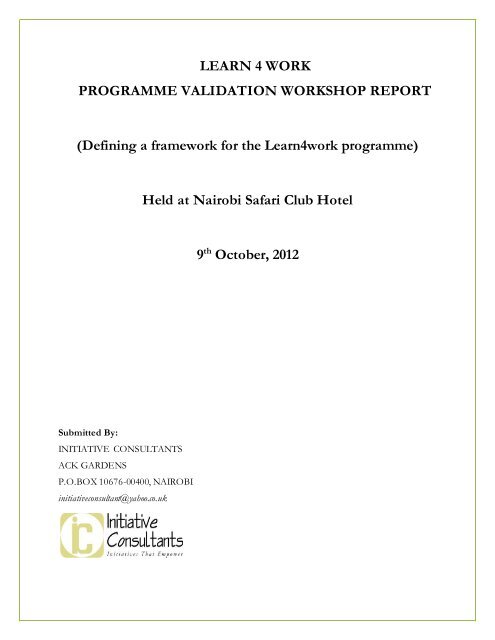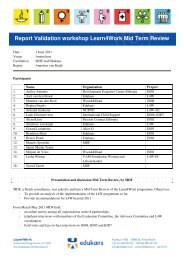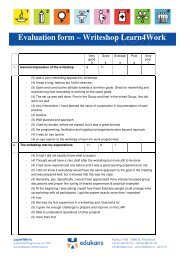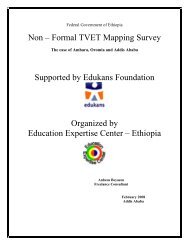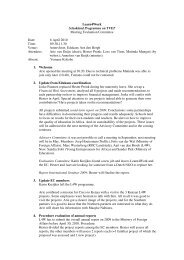LEARN 4 WORK PROGRAMME VALIDATION WORKSHOP REPORT
LEARN 4 WORK PROGRAMME VALIDATION WORKSHOP REPORT
LEARN 4 WORK PROGRAMME VALIDATION WORKSHOP REPORT
Create successful ePaper yourself
Turn your PDF publications into a flip-book with our unique Google optimized e-Paper software.
<strong>LEARN</strong> 4 <strong>WORK</strong><br />
<strong>PROGRAMME</strong> <strong>VALIDATION</strong> <strong>WORK</strong>SHOP <strong>REPORT</strong><br />
(Defining a framework for the Learn4work programme)<br />
Held at Nairobi Safari Club Hotel<br />
9 th October, 2012<br />
Submitted By:<br />
INITIATIVE CONSULTANTS<br />
ACK GARDENS<br />
P.O.BOX 10676-00400, NAIROBI<br />
initiativeconsultant@yahoo.co.uk
List of Abbreviations<br />
ASAL’s<br />
Arid and Semi Arid Lands<br />
EF<br />
L4W<br />
NITA<br />
TVET<br />
Edukans Foundation<br />
Learn4Work<br />
National Industrial Training Authority<br />
Technical Vocational Education and Training<br />
ii
TABLE OF CONTENTS<br />
List of Abbreviations .................................................................................................................................................................... ii<br />
1.0 INTRODUCTION ........................................................................................................................................................ 1<br />
Workshop Objectives .............................................................................................................................................................. 1<br />
Expected Outputs and Outcomes........................................................................................................................................ 1<br />
1.1 Workshop Content .................................................................................................................................................... 1<br />
2.0 <strong>WORK</strong>SHOP PROCEEDINGS............................................................................................................................... 2<br />
2.1 Preliminaries ........................................................................................................................................................................ 2<br />
2.2 Workshop Management and Coordination ................................................................................................................ 2<br />
2.3 Presentations ....................................................................................................................................................................... 2<br />
2.3.1 Introduction to Learn4work ................................................................................................................................... 2<br />
2.3.2 Project Example L4W............................................................................................................................................... 4<br />
2.3.3 Mapping Study ............................................................................................................................................................ 5<br />
2.3.4 Plenary........................................................................................................................................................................... 5<br />
3.0 CLOSURE ........................................................................................................................................................................ 6<br />
4.0 APPENDICES List of Participants ........................................................................................................................... 6<br />
iii
1.0 INTRODUCTION<br />
Workshop Objectives<br />
The workshop was guided by the following objectives:<br />
a) To become acquitted with L4W and what kind of opportunities it has for Kenyan development<br />
b) To learn from experiences of previous L4W projects<br />
c) To define the L4W framework to operate:<br />
i. economic sectors and<br />
ii. niches regarding TVET<br />
Expected Outputs and Outcomes<br />
The expected output of the workshop was a workshop report. The expected outcome of this workshop was<br />
increases participation of the private sector in TVET activities and enhanced TVET and its quality at<br />
institutional level in Kenya and the world over.<br />
1.1 Workshop Content<br />
The workshop broadly covered the following key areas:<br />
a) An introduction to the L4W programme<br />
b) Reflection on the past L4W projects and preparing for a new phase of activities<br />
c) A review of a L4W project example (TVET Ex-change Project)<br />
d) A mapping study<br />
e) Validation<br />
f) Identifying niche for Learn4work<br />
1
2.0 <strong>WORK</strong>SHOP PROCEEDINGS<br />
2.1 Preliminaries<br />
The workshop commenced with a word of prayer by Daniel Kimutai at 10.30 am. Opening and<br />
welcoming remarks were made by Mr. Nyerere who then welcomed Mr. Sitati of LEC- Kenya to<br />
coordinate the workshop. Mr. Sitati emphasized the importance of the workshop to the members<br />
and the organizations they were representing given the relevance of its topics. He hoped that the<br />
participants would be keen on the proceedings to make the day worthwhile will keeping their<br />
contributions within the stipulated time schedule.<br />
The workshop coordinator introduced himself and then asked the team to introduce themselves in a<br />
brief introduction session that involved the participant’s name, the company/organization s/he was<br />
representing and its role in the L4W programmes.<br />
2.2 Workshop Management and Coordination<br />
The workshop coordinator guided the team through the proposed programme. It was agreed that<br />
instead of breaking for tea for 15 minutes, participants should feel free to take a tea as the first<br />
session proceeds considering that there was a lot to cover for a day he also urged the facilitators to<br />
observe the time allocated to them without much extension. With those amendments, the<br />
programme was adopted to guide the workshop proceedings.<br />
2.3 Presentations<br />
2.3.1 Introduction to Learn4work<br />
The Lead facilitator Hester Pronk guided the participants through understanding the basic concepts<br />
of the Learn4work programme where she outlined that the programme was coordinated by Edukans. An<br />
Introduction to learn4work as well as the programmes objectives was discussed. These focused on the: why,<br />
what, how, who, when and where of Learn4work. It was noted that Learn4work is a programme aimed at<br />
improving vocational education in Africa by linking African and Dutch organizations, schools and people.<br />
The programme contributes to:<br />
i. the number of people who can learn a trade;<br />
ii. the quality of vocational training and<br />
iii. better alignment with and flow though the job market.<br />
2
Vocational Training was said to be the basis for finding work or starting a business in order to offer young<br />
people more opportunities to improve their income and raise their standards of living.<br />
The Facilitator explained that vocational education in Africa and for that matter Kenya has long been of low<br />
priority and pointed out that the private sector should get more involved in TVET activities since the sector<br />
forms the local labor market. She further explained that with the growing world population faced with high<br />
poverty levels, unemployment and food insecurity, there is urgent need for Kenya and the rest of the world to<br />
enhance TVET and its quality at institutional level. Participants appreciated the fact that the government was<br />
presented in the workshop and that TVET should be linked to the labor market.<br />
The Facilitator reiterated that TVET is an important part of basic education and thus should be<br />
strengthened in terms of access, quality, relevance and institutional development. It was explained<br />
that with a firm TVET framework in place, the labor market will receive skilled labor and more<br />
people will be employed since they have the required skills in the job market. In addition, the<br />
unskilled staff in the industry will be able to go back to TVET for training and increase their<br />
productivity.<br />
As a way of recap, the facilitator explained that it was necessary to understand the characteristics of<br />
Learn4work as working in partnership among various sectors, communities and governments. She<br />
challenged the participants to participate in exchange of programmes, knowledge and experiences. It<br />
was also outlined that focus on specific sectors was a characteristic of L4W where participants were<br />
challenged to bring focus on the changing labor market and device appropriate TVET programmes<br />
that meet the market needs.<br />
On the extent of L4W in Kenya, The facilitator explained that short term intervention guidelines<br />
were being processed and would be released in the near future. She observed that locally, the L4W<br />
network is not fully enhanced and the Edukans Foundation is planning to employ a local<br />
coordinator whom they will together do extensive capacity building and training.<br />
It was highlighted that the Dutch government is recommending that EF takes up only four<br />
countries in Africa instead of the current five and that EF was yet to decide which of the five<br />
countries will be dropped. The lead facilitator however stated that Kenya and Ethiopia are two<br />
countries in which the L4W programme has been successful and hence are likely to be part of the<br />
chosen four.<br />
3
The Lead Facilitator also explained that EF will be making a guide line on the funds available in<br />
order to facilitate participants to understand the realistic budget. She observed that it was not<br />
realistic to have a budget of 1 million Euros. It was explained that the guide lines on funding were<br />
ongoing and will be finalized once there is a country coordinator in place. The Dutch Government<br />
committed to provide 34% of the funds involved in EF projects and participants and NGOs were<br />
advised to engage in more fundraising activities.<br />
The facilitator concluded that ht ere is connection between the labor market and TVET but noted<br />
that cooperation with the labor market was going to be a difficult task for EF and the TVET team<br />
hence calling for extensive communication, patience and information sharing to achieve it. She cited<br />
several differences in ideologies, systems and policies between the North and South as the cause for<br />
the difficulties.<br />
The facilitator observed that EF was not aware of the scope i.e the number of teachers, learners and<br />
trainees (beneficiaries) it does reach in its engagements and thus challenged the TVET partners to<br />
improve on reporting and records.<br />
2.3.2 Project Example L4W<br />
The facilitator Mr. Mutinda Munguti introduced SASOL as one of the Edukan’s L4W exchange<br />
programmes whose thematic areas were on land and water management, vocational education and<br />
enterprise development. In justify the course of SASOL, the facilitator explained that 70% of the<br />
population lives below the poverty line with no access to formal education and thus on this<br />
backdrop, the youths have to be creative through TVET. SASOL involves the youth in exchange<br />
programme internships, apprentices involving post primary school youths in: welding, mechanics,<br />
tailoring and hair plaiting. He suggested that the micro level skilled trainees should also be linked to<br />
the private sector through TVET.<br />
The Facilitator stated that L4W TVET is important as it adds value to the society by stimulating an<br />
entrepreneur culture among the people and allowing students to choose courses that are relevant at<br />
the labor market level. It was also explained that SASOL links TVET and the employment market<br />
by initially doing a market research to determine relevant skills and then train graduates in those<br />
skills and stimulate their uptake into the job market through networking. SASOL in collaboration<br />
with local polytechnics has formalized the informal TVET trainees’ skills by providing them with a<br />
4
“pass port’’ which is filled by every mentor to an apprentice showing the skills the person has been<br />
trained in.<br />
2.3.3 Mapping Study<br />
The Facilitator Mr. J. Nyerere explained that the main issues that need to be overcome by TVET are<br />
food insecurity and slow development of the private sector. He explained that the labor market<br />
should not only involve in the creation of formal employment but also in the creation of self<br />
employment.<br />
The facilitator recommended that to posh the TVET agenda in Kenya the NITA and KACC should<br />
be involved more in the programme. He also explained that in Kenya, a very small percentage of the<br />
total education budget is invested in TVET and hence suggested that the TVET partners strategize<br />
on hoe to push the government into increasing the funding of TVET education. It was explained<br />
that due to continuously changing job skills requirements, there is need to continuously retrain at all<br />
times in order to remain on top of the development ladder.<br />
It was observed that employment opportunities are only growing in the informal sector hence there<br />
is need for more TVET and preparation of the TVET activities. It was however observed that there<br />
was a difference in the ideologies of the Ministry of Higher education and that of the youth affaires<br />
and therefore it was suggested that NITA be involved to enhance agreement and involvement of<br />
TVET in formal education. It was explained that agriculture had a very high potential for TVET and<br />
thus more capacity building should be done to enhance uptake of agricultural TVET activities.<br />
2.3.4 Plenary<br />
At plenary, participants suggested that for ASALs it was important to broaden the agricultural sector to<br />
include Bee Keeping which had especially great potential. The consensus was that in order to attain the<br />
overall goal of food security in Kenya, it was imperative to make Agriculture the Key economic driver to<br />
achieve the main objectives of L4W TVET.<br />
The partners were to explore linkages to Agriculture by focusing on related areas of manufacturing (value<br />
addition) and ICT (e.g. development of apps for marketing agricultural outputs) that are of priority in their<br />
respective areas to enrich the final document and reflect the minds of all the stakeholders.<br />
At the end of this session, Mr. Nyerere thanked the participants for their active participation and<br />
handed the program to LEC-Kenya’s Aggrey Ndombi for closure.<br />
5
3.0 CLOSURE<br />
A vote of thanks was moved by Hester Pronk who appreciated LEC-Kenya for organizing for this forum and<br />
SASOL and all the participants and the facilitators for playing their roles effectively. In her closing remarks,<br />
Hester thanked all the participants for turning up for the workshop. She explained that the next stage will be<br />
to finalize the day’s activities through email communications and developing an agreement. He assured the<br />
participants that the call for proposals will follow in December 2012 which will be followed by match making.<br />
The workshop ended at 5.30 pm with a closing prayer from Catherine Karugu of African Inland Church.<br />
4.0 APPENDICES List of Participants<br />
No Name Organization<br />
1 Cres Baari ILIDP<br />
2 Daniel Kimutai NCCK<br />
3 Catherine Karugu African Inland Church<br />
4 Linda Ndethiu Red een Kind/Help A Child<br />
5 Naomi Ragai NairoBits Trust<br />
6 Victor Omondi NairoBits Trust<br />
7 Mutua Ancent K. AHITI- Kabete<br />
8 Edmond Omongi Baraka Agricultural College<br />
9 Grace Vuhya Embassy of the Netherlands<br />
10 Aggrey Ndombi LEC<br />
11 Doreen Odhiambo African Inland Church<br />
12 J.Mutinda Munguti SASOL<br />
13 Sitati Makhandia LEC<br />
14 John Nyerere ICL Facilitaton<br />
15 Edwin Buluma LEC<br />
16 Gabriel Ratemo YEEP<br />
6


